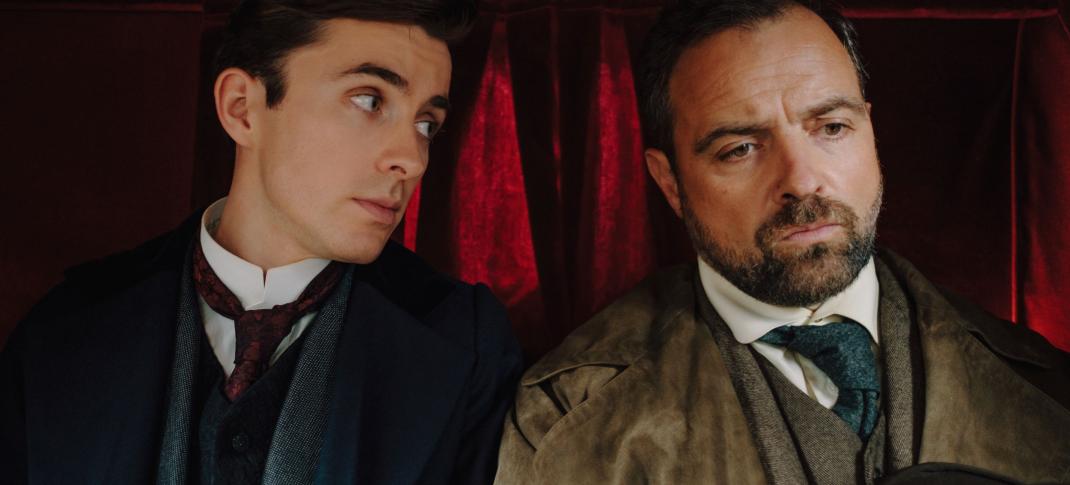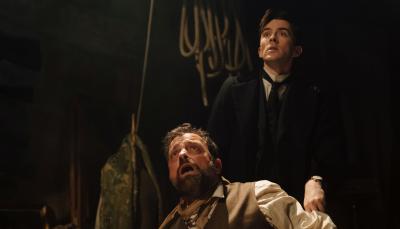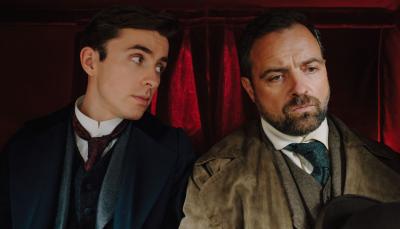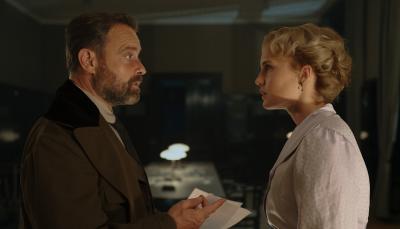'Vienna Blood' Season 1, Episode 3 Recap: "Queen of the Night, Part 1"

Matthew Beard as Max Liebermann and Juergen Maurer as Oskar Rheinhardt in 'Vienna Blood' Season 1
© 2019 Endor Productions / MR Film
At the end of Vienna Blood's first mystery, Max did the sensible thing and asked Clara to marry him. It's now a few months later, 1907, and Clara is being fitted for gown and veil while Max ponders whether or not love is real. (The legend he recites, by the way, is the Greek myth of the Soulmate from Aristophanes.) As Max and Clara's engagement party gets underway, down in the Spittelberg Quarter, viewers meet Josefine (Elsia Afie Abgaglah), an escort at Borek's brothel.
Reinhardt: I was just inches from a clean getaway.
Det. Oskar Reinhardt is in attendance at the engagement, but the inspector can't stay long. There's been a murder, and Max stares longingly as he leaves. Clara, who is no fool, tells him to go. The victim is, naturally, Josefine, arranged in a Virgin Mary style display. The rest of Borek's girls have also been slaughtered. Worse, von Bulow is here, having raced to get there first, and insists he is in charge now.
Max pins this as an obsessive, so Von Bulow drags Josefine's regular customer, Viktor Krull (Thomas Mraz). But before he can continue, Police Commissioner Strasser intervenes. Seeing Max is here to consult, and mindful of Mendel's patronage, the case is given to Reinhardt. Krull's mother (Margarete Tiesel) arrives, explaining Viktor is, in the parlance of the time, "feeble-minded." His obsession with Josefine wasn't sexual, she insists. But the cross she was holding in her posed position turns out to be Viktor's. Max heads home, having helped solve the case, but Leah's not about to let her brother off the hook for leaving. "This is not how a man in love behaves." She's not wrong. Max is obsessed with crime, and his patients, which puts Clara at a distant third, at best.

Von Bulow is enraged to see Reinhardt come up with an answer so quickly, complaining he only solved it because of his "Jew-Doctor." Meanwhile, von Bulow's been assigned to find out why someone stole and murdered a snake from the zoo, and draped it over a statue of Mozart. But even as Reinhardt is congratulated from all sides, Max is uneasy. There's no murder weapon, and a search of Viktor's house turns up nothing suggesting a violent mind. On the other hand, there is a bloody shirt. His mother insists it's because her son works at an abattoir (a slaughterhouse). But Strasser is ready to call it a job well done, and one of the uniformed officers (Edmund Jäger) is all too happy to take justice into their own hands when it comes to someone who committed a crime so barbaric.
With no case, Max heads back to the hospital, where Professor Gruner shows off his newest patient, Herr Bieber (Michael Niavarani), a delusional obsessed with Duchess Marie of Mecklenburg-Schwerin. He also goes on a date with Clara to the museums, where they run into his former patient, Amelia Lydgate. Clara is shocked; the woman doesn't remember her. The encounter distresses Max, as it dawns on him that she doesn't remember anything. Clara is starting to realize her place in the pecking order of his mind is far from first, at the worst time possible. Mendel's newest investor, Gustav von Triebenbach (Ulrich Noethen), pushes him to stop hiring Hungarians and Czechs, slipping him a flier about "purifying the city," and suggesting nationalism is the way of the future. Mendel says nothing, but his eyes tighten. He makes the mistake of taking the flier home, where Max happens across it, and goes through the roof.
Meanwhile, the trip into the city center does spark something, as Max watches a pair of uniformed officers stroll by, and he notes the ceremonial sword as a match for the missing murder weapon. If he's right, Krull was the one who bathed and set her body, but the murderer was there before him. Reinhardt sighs, but tells Max if he can provide proof, he'll listen. They head back to the brothel, where Max points out the Madame was armed with a secret gun. And yet, she didn't stop the killer from slaughtering them all — because his weapon was part of the uniform. When they ask Krull who he saw when he arrived, he draws a soldier.

Reinhardt questions the head of the nearby regiment, Colonel Kabok (Norman Hacker), who is insulted at the idea one of his men did this. Meanwhile, Max takes the bloody shirt to Amelia and asks if she can test it. It's a crude "animal or human" blood test, but it's conclusive: The blood isn't human. But it's too late for Viktor. The uniformed officer from earlier has already had him beaten to death. Max is sidetracked from comforting Oskar over feeling responsible, as von Bulow waylays him hoping for help with his snake case.
The next day, a new victim turns up, slaughtered in the same manner as the girls. A Czech poultry seller left for dead among his flock. Reinhardt finally has proof of Krull's innocence, too late. He's also officially got a serial killer on his hands. There's a symbol over the victim, which was painted at the brothel too. In dawning horror, Max realizes where he's seen it before — the flier his father had. The symbol is of "The Brotherhood of Primal Fire." This means Mendel now needs to be questioned. Not that he knows about the group, but, as a clothier and artisan, he turns out to be quite useful. He finds the artist's hidden signature on the flier: A. Olbricht.
Reinhardt and Max track him down, where Olbricht (Andreas Lust) is designing sets for the upcoming opera The Magic Flute. He claims it was a private client who paid cash, and that he didn't care about the politics of what he was creating. But under Reinhardt's questioning, he admits if they come to his next exhibition, they'll find all his patrons there, including the Brotherhood of Primal Fire.




